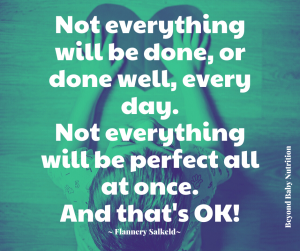11 Survival Tips from a Home-school Mom of 7

Jane Flannery
Home-school Mom of 7
flanneryjane@hotmail.com
Schools are closed, and the panic of even thinking about taking on home-schooling your kids has set in. So I asked a long time home-school pro, Flannery Salkeld, mom of seven to share some survival tips with us so we can actually enjoy our little kids during this extra trying time.
A quick perspective change
Before we dive right in to the 11 tips here are two really, REALLY important perspective switches Brett, Flannery’s husband, suggests:
- Realize that most days you can probably get the content you’d get in a school day in about 2 hours, though that number is a little higher in the higher grades. So don’t worry about keeping them busy for 7 hours a day.
- Everything you do is education. Don’t panic about the curriculum. Enjoy your kids and work on them enjoying their time together and with you. That is priority number one. That will pay dividends for years. Your kids aren’t going to end up adults not knowing the ONE IMPORTANT THING that everyone was supposed to learn in grade whatever.

And remember, this is a great opportunity to get to know your kids better.
When COVID-19 is over, you have succeeded if you have done that.
Make that your goal!
11 Tips For A Home-schooling Newbie

1. Structure
Map out a structure or routine for the day. Keep it simple and incorporate things like meal and snack times (more on that later), outside time, higher and lower-key activities (including naps if applicable), tidy up times, and books or audiobooks.
Having a routine shifts responsibility from you to the routine. When your kids are resistant, hang on to your vision of the routine but at the same time expect things to be bumpy at first. Remember, everyone needs time to adjust.
Pro Tips:
- Save screen time for when you need it most (more on that later).
- Consider your and your kids’ times of naturally higher and lower energy when planning.
- Sandwich pleasant and less pleasant activities.
- For example, if your kids are reluctant to go outside, you could say “It’s outside time and then hot chocolate time.” (It’s not a bribe, it’s just on the schedule!)
- Sandwich pleasant and less pleasant activities.
Here is an idea of what you COULD include when mapping out a routine for your kids:
Keep in mind:
- Start building your schedule off of what is already going well, or working day to day.
- You don’t need to have every 30 minutes of the day planned.
- Follow the natural rhythm of the day with your kids, and pivot when they need something fresh to focus on.
- Build moments of connection early on in the day and throughout the day. More on this below.
- If your mind is swirling with all the things you “should” do and teach your kids, choose one! More on keeping it simple and dealing with the “shoulds” below.
2. Connect early in the day
Try to connect with your little kids early in the day with a small amount of focused attention. Great examples of this are reading a book or playing a short game.
They will be less likely to be clingy or whiny when you have to get things done.
Why?
Because you’ve invested time in connecting with them, reaffirming that bond and love.
This same idea can work when you are trying to get your kids to play independently. You can sit down with them and play for a few minutes to help them get engaged, and then drift away.
3. Simplify
A calm and uncluttered environment will make it way easier for you to do your routine and feel good at home.
Step back and envision the flow of the day that you have planned, the activities, the meals.
Ask yourself:
- Is everything accessible?
- What’s in the way?
- What’s overwhelming?
Pro tips:
- Boxing up things and storing them out of the way.
- You don’t have to worry about whether you will be getting rid of anything permanently at this point. Just clear away things that are stressing you out and getting in the way of a peaceful home life.
- Include: Anything you aren’t using now, excess supplies and toys, and even excess clothes.
- You don’t have to worry about whether you will be getting rid of anything permanently at this point. Just clear away things that are stressing you out and getting in the way of a peaceful home life.
- Consider rotating toys
- Having too many decisions to make is overwhelming, especially for kids.
- It’s easier for kids to focus if they have fewer toy options.
- They will play better and for longer periods at a time.
- Having too many decisions to make is overwhelming, especially for kids.
A good book on this topic is:
Simplicity Parenting by Kim John Payne.

There is a special audio series at simplicityparenting.com in response to today’s situation.
4. Meals and Snacks
Keep meals and snacks really simple and try to plan ahead.
We do breakfast, lunch, afternoon snack, supper, and maybe a very small evening snack. They are at around the same times every day. If your kids get up early they may need a morning snack. Have water available in fun cups if it isn’t time to eat yet.
When it’s time to eat, feel free to only offer what you are comfortable with them having. Again, limit options.
I am happy to share my meal and snack ideas on request. I could go on, but instead I will recommend a great article by my Registered Dietitian friend Lacey Engel, called “How Do I Stop My Kid Asking for SNACKS All Day?”

5. Screen time
As much as you can, try to save screen time for later in the day and times when you most need it.
For example:
- When making supper, or meals.
- Trying to get work done where you can’t be interrupted.
- When your energy is particularly low.
I struggle with screen time getting out of control when I am stressed out; however, using the screen too much always backfires. The kids are whinier and don’t play as well!
Pro tips:
- Think about what your personal criteria is for what your kids watch and have some ideas for options you are OK with.
- To keep my stress low and the atmosphere pleasant, I try to pick audiobooks, kids’ shows and nature documentaries that I personally enjoy or at least don’t mind!
Need some more ideas on keeping kids entertained? Check out this post, What to do with kids when you’re stuck at home – The Ultimate Guide.

6. Social Media
You might find you need to make a screen time schedule for yourself, too. Especially nowadays with new information coming in all the time about the pandemic. The news and social media can be extremely distracting.
Pro tip:
- You might want to practice “social media distancing”
- Set certain times or a certain number of times per day that you will check in.
- This allows you to stay present in your day the rest of the time.
7. Perspective
These last few tips are mostly about your mental game. When you feel stressed or overwhelmed, try to observe your situation without judgment.
Pro tips:
- Mentally step back and take a bird’s eye view of your day and of your problem.
- Brainstorm how to solve problems and alleviate pain points.
- Since you can’t do everything, choose where to cut corners.
- Pick your battles and figure things out gradually.
- You don’t have to respond to every misbehaviour right away.
8. Juggling is an art form
Not everything will be done – or done well – every day. Not everything will be perfect all at once.
For example:
I might make my kids a great lunch and congratulate myself on the enriching preschool activities I provided that morning.
BUT…. Realize I have eaten and drank nothing and have forgotten to make an important phone call.
I am dressed and all ready for the day. Have precooked a bunch of chicken and made soup. The baby is napping for an extra-long time.
BUT…. I look up and realize that the twins are on their second hour of Ben and Holly’s Little Kingdom.
The more purposefully you can juggle, the more peaceful and in control you will feel!

I can walk by a particular mess and say to myself, “Not now. That will get cleaned up at clean-up time.”
I’ve experienced that it is possible for me to spend literally all day in the kitchen, or all day trying to clean up, if I don’t intentionally structure how I will spend my time.
9. Eliminate “should”
I think that “should” is almost never a helpful word.
Listen to your thoughts. If you hear “should,” try to replace the word with something more specific to see what you actually mean by “should.”
For example:
“I should be dressed by now”
Could mean….
“I would feel better about myself and more energetic if I were dressed.”
In this case, you might decide to prioritize getting dressed because you want to take care of yourself.
Or it could mean…
“If my neighbour sees me, I worry she will judge me for not being dressed.”
In this case, you might just say “Pffft” and not worry about it any more.
10. Notice the positive
There will be both predictable and unexpected benefits of having your whole family staying home together.
Looking for all of the benefits and commenting on them out loud to your kids will help everyone’s outlook! You can notice more time to sleep in, the option to eat peanut butter, to reheat leftovers for lunch, to not have to rush out the door.
Pro tips:
- Talk up how lucky you all are to get the chance to spend more time together.
- Interpret and explain situations to your kids on how their energy and actions are being helpful, or could be used.
- “Look! She’s smiling because she hears your voice and is excited you are here!”
- “He’s crying; how can we help him?”
- “Wow, you are a great big brother; he really loves when you play with him!”
- “Look, he wants be like you! Can you show him how to do it?”
- “She will learn to talk by listening to us!”
- “I need your help. Can you please bring a diaper from over there? She needs a new one.”
You get to create the atmosphere in your home!

11. If Mama Ain’t Happy…
Finally, paying attention to your needs and preferences wherever you can is great for you and great for your kids.
They’ll learn from your example and, overall, they will be happy if you are happy.
Ask yourself:
- What do you need to do in the morning to feel ready for the day?
- If you are not used to staying home, consider what kind of clothes you enjoy wearing that are comfortable and practical for your new situation.
- What really bothers YOU and is worth your attention?
- For example, if you can’t handle whining, but don’t care if the kids jump on your couch, spend your energy training them not to whine.
- What kind of a break do you need to recharge?
- Read or listen to a podcast by yourself?
- Talk on the phone with a friend?
- Leave the house?
- Be alone in the house?
- Have music on in the background, or silence?
- What are you interested in doing with the kids?
- If you like having kids “help” you in the kitchen, do it. If the idea makes you want to scream and run away, don’t do it.
- Choose something else that is more sustainable for you.
It’s a challenging time right now, and there are so many great choices you can make for your kids. It’s perfectly fine to pick the ones that suit YOU.
I hope these suggestions help give you the space to enjoy your extra time with your children!
Feel free to comment if you have questions or want more examples for any of the points I mentioned. If you want to get in touch with me directly, you can email me at flanneryjane@hotmail.com

Jane Flannery
Home-school Mom of 7
flanneryjane@hotmail.com

